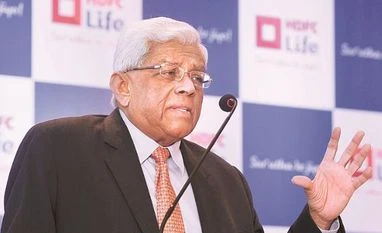The leader in Parekh holds values such as integrity, transparency and trust in the highest regard. Parekh, a recipient of the Padma Bhushan award, is known to speak his mind, whether it is on policies of the government, the Reserve Bank of India or the Securities and Exchange Board of India, and that’s why he is the go-to man for policymakers.
For the better part of his career, Parekh has been single-mindedly focused on building HDFC into the top housing finance company, but has also helped build the country’s mortgage finance sector, having helped set up several other housing finance companies. He has also led the charge in making the real estate sector more transparent. As a result, HDFC has made it possible for millions of citizens to achieve their ultimate goal of buying their own homes. HDFC also promoted GRUH Finance in 1988 with a focus on rural housing loans.
Today, HDFC’s total assets are Rs 2.8 trillion and the company consistently goes on to register double-digit growth. Under Parekh’s leadership, HDFC also diversified into other sectors, as the group forayed into areas such as banking, asset management, life and general insurance, even an education finance company and a real estate venture fund. HDFC Bank and HDFC Life Insurance are both listed on the stock exchanges, and HDFC Asset Management is planning to come out with an initial public offer soon.
After qualifying as a chartered accountant in the UK, Parekh started his career at Ernst & Young in New York. He joined HDFC as deputy general manager in 1978 and was appointed managing director in 1985 and executive chairman in 1993. In 2010, he became non-executive chairman.
In 2012, he was appointed chairman of the high-level committee financing infrastructure. To give the country’s infrastructure sector a boost, Parekh became the founding chairman of Infrastructure Development Finance Company (IDFC), which finances infrastructure projects in India. He stepped down in 2013 after being its chairman for 15 years. IDFC got a banking licence in 2014 and started operations in 2015. Ironically, it competes with HDFC Bank.
Parekh is sought after to join the boards of leading Indian and international companies and share his expertise. He is an independent director on several boards, including companies such as Vedanta Resources plc in the UK, DP World in Dubai and Indian Hotels. He is also the non-executive chairman of GlaxoSmithKline Pharmaceuticals and Siemens India. Parekh, the statesman, works regularly with the government as an expert on issues and matters of national economic significance, which is why he’s also associated with several committees set up by the government and regulators.
When he retired, Parekh had said he would soon find out who his real friends in the corporate and social spheres were, as not many wanted to know those who had exited positions of power. For Parekh, however, his Rolodex has only expanded since he stepped down. Even today, Parekh is seen as the de facto voice of corporate India and both older and younger leaders knock on his door for sage advice.
A fan of legendary investor Warren Buffett’s annual speeches, as well as Peter Drucker’s management principles, Parekh has said that if he had to do it again he may have wanted to work towards bringing about more change in public sector undertakings, which clearly require a lot of modernisation.
The ace financier remains a sobering voice in a milieu of pandemonium and confusion, with many conflicting opinions that aren’t always clearly articulated or based on facts. He is also known to throw parties, invitations for which are most sought after by captains of industry. Outside of work, Parekh enjoys food, beer and his regular game of bridge.
To read the full story, Subscribe Now at just Rs 249 a month
Already a subscriber? Log in
Subscribe To BS Premium
₹249
Renews automatically
₹1699₹1999
Opt for auto renewal and save Rs. 300 Renews automatically
₹1999
What you get on BS Premium?
-
Unlock 30+ premium stories daily hand-picked by our editors, across devices on browser and app.
-
Pick your 5 favourite companies, get a daily email with all news updates on them.
Full access to our intuitive epaper - clip, save, share articles from any device; newspaper archives from 2006.
Preferential invites to Business Standard events.
Curated newsletters on markets, personal finance, policy & politics, start-ups, technology, and more.
Need More Information - write to us at assist@bsmail.in
)